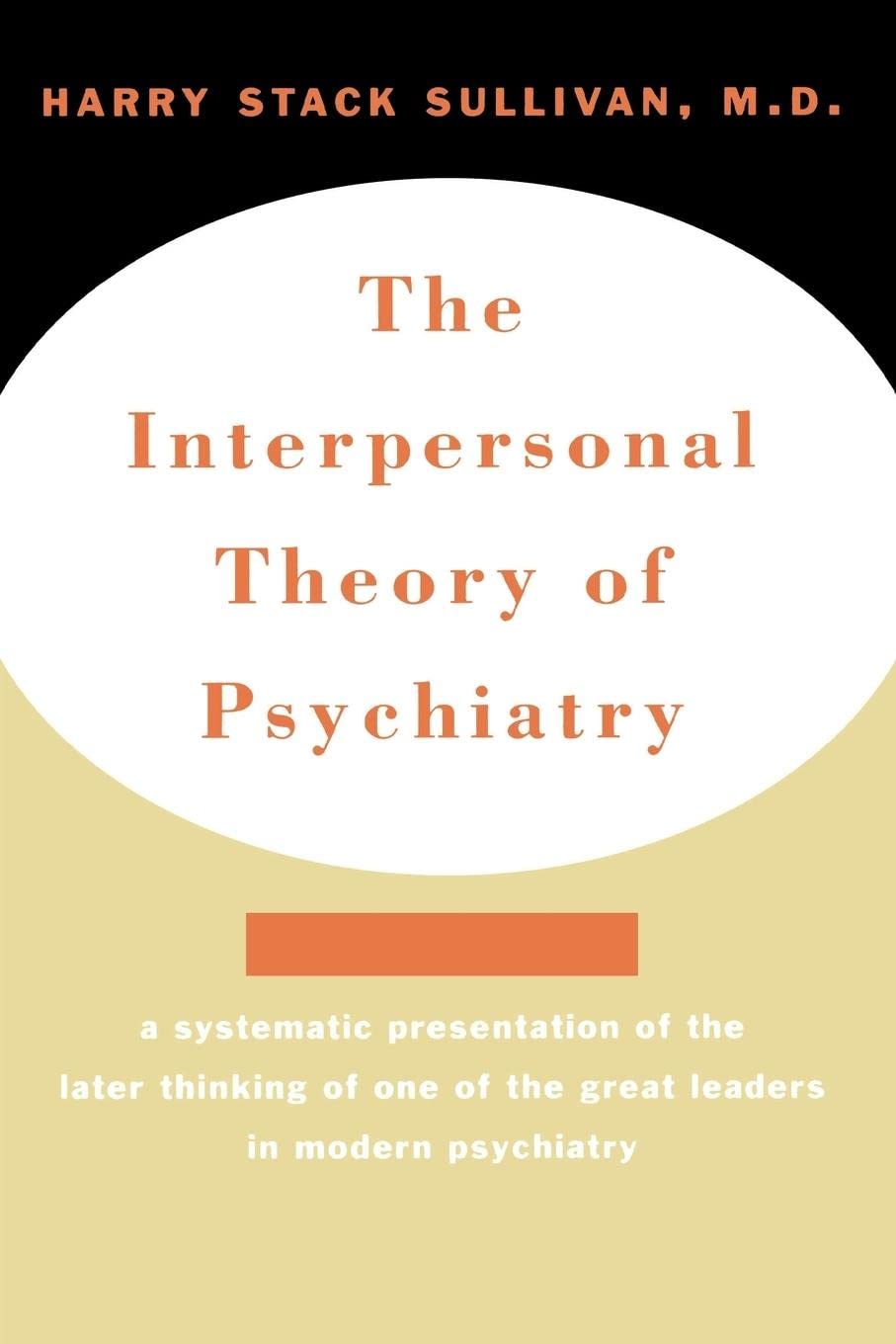Deliver to Finland
IFor best experience Get the App


The Interpersonal Theory of Psychiatry
K**E
Harry Stack Sullivan?
In the world of Freud and Jung, of Horney and Adler--American Harry Stack Sullivan is almost an anomaly, -- often overlooked except by specialists, here we have something worth reading and thinking about on his work. Years ahead of his peers, Sullivan shares his learnings and we are the better for having the benefit of his experience. Read the other psychoanalysts by all means, but do not overlook Sullivan or his work at the same time.
J**R
Five Stars
A true classic!
B**H
Book great, Print Quality poor
I have a very old copy of this book and loved it so much that I wanted a better copy for my library.But, the print is thick and hard to read.. i prefer my old one
D**O
Mr. Citizen of Precious Time blares his philippic at suburban minions
Here is a 393 page, posthumously published book from 1953 by American psychiatrist Herbert Harry Stack Sullivan, M.D. (1892-1949), who introduced interactional/cultural forces to intrapsychic psychoanalysis by describing how they cause mental illness. He says, "...psychiatry...cannot be concerned with anything which is...private...only with the human living...in...the public mode...psychobiology seeks to study the individual...and...cultural anthropology...the social heritage...of...a group, so psychiatry--and its convergent, social psychology--seeks to study the biologically and culturally conditioned...in...interpersonal situations...." In this volume Sullivan outlines psychological development from infancy to late adolescence, as well as interpersonal relations gone awry. The author explains different behaviour patterns or "dynamisms": malevolence, intimacy, the self-system and lust. Touching on the last mentioned, British social psychologist Michael Argyle, in "The Psychology of Interpersonal Behaviour" (1967), states, "...sexual motivation can be looked at as a social approach drive similar to the need for affiliation....leading to physical proximity...."And so it was over two thousand years ago the Romans propounded the word "sexus," defined as the intrinsic dissimilarity of man and woman. This became the word "sex" in the English translation, a term recurrently applied in everyday life. The meaning of this word is devoted not only to the reproductive aspect of human beings or the natural differences existing between male and female, but also to the expression of one's most personal feelings. Complete sexual fulfilment is a realization of one of life's ultimate joys.The sex response begins with sensation, the first impulse to embark upon the sphere of consciousness. As the force initiating it is augmented so is the sensation, but not at the same expedition. Internal changes then occur as the input, which is never tantamount to the sensation itself, is fed into the central nervous system and channeled to various organs. When enlivened, this sensation procures meaning, becoming a sense perception of which sight is the foremost. Depending on how one is disposed, this vision may be enhanced if one has touched or heard it before. Motherly affection in early childhood is of paramount importance in the development of a person's tactile sense, particularly in girls who do not have as many arousal areas as boys do at this time. The olfactory sense may often be indistinct, like that of touch, and develops in the skin as an individual matures. Music, which can have a penetrating effect on the nervous system, is frequently involved in the development of one's auditory sense. Although the early sequential order of sensory development in adolescents is tactile, auditory and visual respectively, this order is reversed as a person approaches adulthood.Sensations cause internal pressure, exerting a strain on the organism because of stress when certain demands are not complied with. When this "primal" or indigenous need is unfulfilled, a lack is exhibited. This causes "primal pain" usually felt at the heart and genitals, effectuating tension. Tension, a peripheral phenomenon, may manifest itself in the three social needs that we have, specifically lust or the pursuit of sexual release (motivated by the sex drive), security or the desire to be emancipated from the dangers of the outside world (motivated by diffidence), and lastly, intimacy, the yearning to always be with someone (motivated by solitude). All of these needs may encounter one another at some time; and it might be noted that lust may not always be integrated with intimacy, which can inseparably implicate love itself, i.e., the caring for the person concerned and not just a sheer physical endeavour. Being intimate, however, does not essentially guarantee security if the relationship is ephemeral; and lust, which is the last need to mature, undoubtedly warrants no security. A concurrence of all these needs provides a wholesome relationship. The "lust dynamism," evolved from the vegetative, central and hormonal functions, is manifested in sexual fantasies, dreams and overt sexual behaviour involving orgasm or part of it.To enhance your comprehension of social psychology and sexuality, read "The Interpersonal Theory of Psychiatry" by Harry Stack Sullivan, where "Mr. Citizen of Precious Time blares his philippic at suburban minions."
J**.
A must read for serious students of psychiatry or psychology
Sullivan's ideas, at the time of their writing, were revolutionary and not accepted by mainstream psychiatry. This book represents some of Sullivan’s best lectures, put together by his students after his death, and gives the student of psychiatry or psychology a penetrating conceptualization of mental health, and problems of living (to use Sullivan’s words). The interpersonal theory of psychiatry is one of anxiety in human relationships, and all of the twists, turns, and maneuvers taken by our personality (self-system) in order to avoid or minimize such anxiety. A must read.
A**R
Two Stars
Printing quality is really bad
R**K
Must reading for shrink types
I am a psychiatrist and Sullivan is rudimentary stuff for anyone looking into others psyches.
A**R
All great
The book arrived in time and in great condition at an affordable price. Altogether I received what I was looking for and I feel quite satisfied. Thank you.
Trustpilot
1 day ago
3 weeks ago